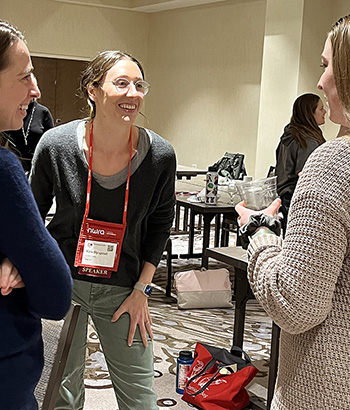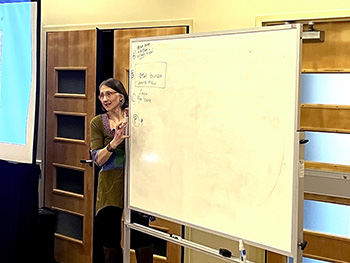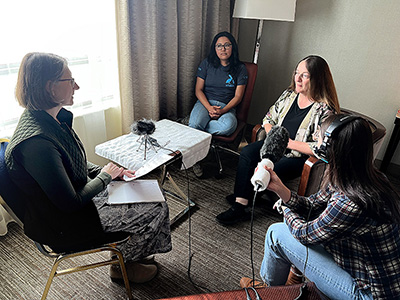P4W’s Other Initiatives
P4W's Other Initiatives
Partners For Wildlife (P4W) strives to offer a range of educational opportunities, hands-on training, and communication capacity in support of improving animal welfare across our focus area and beyond. In an ongoing effort to further our mission, P4W is proud to support the following initiatives:
Wildlife Veterinary Medicine Internship
 Each year, P4W sponsors two wildlife veterinary interns - one in Washington and one in Minnesota. The Washington intern divides their time between Progressive Animal Welfare Society (PAWS) in the Seattle area and Washington State University’s Wildlife Clinic in Pullman, WA. The Minnesota intern rotates between The Raptor Center and the Wildlife Rehabilitation Center of Minnesota (WRC) in Roseville, MN. P4W interns are supervised by experienced wildlife veterinarians at each facility and are given the opportunity to observe and participate in the diagnosis and treatment of a wide variety of illnesses and injuries. Additionally each intern is given ample opportunity to experience offsite learning and networking, including attendance at the P4W Fellowship Kickoff event in Saint Paul, MN and the NWRA Symposium.
Each year, P4W sponsors two wildlife veterinary interns - one in Washington and one in Minnesota. The Washington intern divides their time between Progressive Animal Welfare Society (PAWS) in the Seattle area and Washington State University’s Wildlife Clinic in Pullman, WA. The Minnesota intern rotates between The Raptor Center and the Wildlife Rehabilitation Center of Minnesota (WRC) in Roseville, MN. P4W interns are supervised by experienced wildlife veterinarians at each facility and are given the opportunity to observe and participate in the diagnosis and treatment of a wide variety of illnesses and injuries. Additionally each intern is given ample opportunity to experience offsite learning and networking, including attendance at the P4W Fellowship Kickoff event in Saint Paul, MN and the NWRA Symposium.
Past P4W veterinary interns have gone on to fellowships, other specialty internships, private practice, and full-time work in wildlife medicine. Regardless of the path each intern takes, the experience builds on a foundation of fundamental skills applicable across the range of veterinary practices.
Learn more about veterinary internship opportunities
Collaborations with wildlife veterinarians
P4W aims to advance the state of wildlife veterinary medicine through collaboration on best practices, managing complex cases, and teaching the next generation of wildlife veterinarians relevant knowledge and skills. At P4W we are committed to increasing the presence of veterinarians in wildlife rehabilitation as well as encouraging veterinarian interest in caring for wildlife as an integral part of their long term careers.
P4W has an effort underway, in collaboration with the broader wildlife rehabilitation and wildlife veterinary community, to establish an industry-recognized Certificate in Wildlife Medicine. P4W also offers an array of programming and opportunities for involvement in wildlife. Those include a Triage and Treatment course, outreach to veterinary students, and connecting veterinary students with NWRA courses and work with SAVMA.
Expert-led wildlife rehabilitation workshops and courses
Throughout each program cycle, P4W sponsors and hosts workshops and courses addressing topics critical

to the wildlife sector across our focus area. These offerings vary widely in terms of topic and scope, and P4W will often collaborate with potential audiences to custom-design workshop content to benefit local and regional networks. Our team identifies these key topics, then assembles the necessary teaching and training expertise to deliver an experience that leaves participants better equipped to care for the animals likely to need treatment in their area.
Public outreach
P4W’s newly established Outreach Project Specialist helps address the growing need for strategic communications within the WR sector and between the sector and the general public. Our outreach efforts aim to build community among wildlife rehabilitation peers and wildlife veterinarians, expand public awareness of how human activity impacts wildlife, and increase public acceptance of and understanding of the practice of wildlife rehabilitation for the betterment of our overall ecosystem].
The public outreach arm of P4W conducts regular research across our focus area, gathering information about public information campaigns already underway. We assess campaign impacts and identify topics, regions, and facilities that could benefit from our public communications and wildlife rehabilitation expertise.
As PW4 identifies outreach needs and forms effective strategies to address them, we aid in bridging resource tools across the sector. When necessary, P4W collaborates with local facilities and wildlife rehabilitation professionals on building new resources and tools, both for the general public and professional peers.